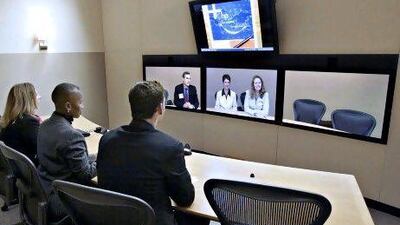The market for unified communications (UC), the technology that allows staff to access a corporate communications network from any device, is set to double over the next few years, with particular growth forecast for the Middle East.
According to the US researcher International Data Corporation (IDC), the market for UC in the Middle East, Europe and Africa was worth US$8 billion (Dh29.38bn) last year but it is predicted to rise to $16.6bn by 2014.
Nora Freedman, a senior analyst at IDC, says the results "show that end users have become more sophisticated about their understanding of UC, as well as having higher expectations".
IDC believes growth in UC is being driven by small and medium-sized businesses wishing to streamline their operations by giving staff access to all of their electronic communications, including e-mail and SMS from any PC, smartphone, tablet or other access device.
Forrester, the international research company, agrees the UC market is about to take off with technology advances such as the increasingly widespread adoption of the new signalling software called session initiation protocol (SIP).
"The next 10 years will deliver open architecture, extended borders, enterprise social media, SIP expansion, and cloud-based collaboration and communication services," Forrester reports.
The company believes the typical UC phone of the future will be a touch-screen device with an embedded camera and wireless headset providing new features such as videoconferencing.
Richard Thurston, a senior analyst at the research company Ovum, says there are three new services that are driving the adoption of UC.
"The first is instant messaging and the second is telephony presence, the application that allows you to see if someone is at their desk or out of the office before contacting them," says Mr Thurston.
But he adds the third application, videoconferencing, is potentially the most interesting and that although top-range videoconferencing is today largely the preserve of big multinationals, the technology will soon trickle down to small and medium-sized organisations.
Top-range telephony conference systems of the type used by some multinational corporations now enable telepresence, which allows people to feel they are actually in another office.
Cisco has developed telepresence features such as a camera that enables users to look each other in the eye. Earlier videoconferencing involved ignoring the video image of the person at the other end of the line and staring at a camera lens above a screen to achieve the same effect. Other enhancements can include floor-length wall screens to create realistic images of people attending a meeting.
"This is enabling businesses to reduce costs by replacing expensive travel plans with effective face-to-face video meetings," says Mr Thurston.
The Middle East, in particular, is expected to experience growth in the adoption of videoconferencing technology. Web conferencing is to grow in the UAE by 20.97 per cent each year between 2010 and 2015, Ovum says. This growth rate is higher than the global average of 18.24 per cent.
"The Middle East as a whole is a substantial growth region for the technology," says Mr Thurston.
"Web conferencing is enabling ways of working, enabling employees to be more productive. Now video is part of web conferencing, we expect that more businesses will adopt the technology. It's an integral part of [UC] that businesses need to consider."
Analysts believe videoconferencing will drive the adoption of UC by reducing corporate travel costs and enabling more staff to work from home or remote locations. The Middle East, with its geographically pivotal position, is placed to benefit hugely from videoconferencing, which can slash corporate travel costs.
"The cost savings based on the reduction of travel costs often support the business case for video expansion," Forrester reports.
"Expanded use of video will evolve business processes in the next 10 years."
Other applications for UC likely to benefit Middle East companies include remote sales support, with which companies can extend their local sales teams by videoconferencing in senior sales support staff from the head office to a sales pitch taking place in another country or on another continent.
Similarly, in-depth staff training can be carried out without the need to fly employees to a central location and accommodate them in business hotels.
Its enthusiasts claim that high-definition, top-of-the-range videoconferencing can also be used to hold virtual business partner meetings and even contract negotiations between companies, something that is generally done only face to face.
But the downside of UC is the security nightmare it can create. By running the corporate communications network across all types of devices, companies multiply an existing security threat several times over, as well as creating new potential gateways for cybercriminals to enter. This is particularly true of small companies with limited IT resources.
Analysts believe that rather than try to assemble and constantly update and protect a software architecture they have built themselves, many companies will prefer to outsource the running of the UC network to an internet player offering cloud computing through connection to a huge computer bank.
The kind of cloud-based IT service now being offered by companies such as Microsoft will also drive the take-up of new services such as videoconferencing and corporate social networking.
Social networking, as popularised by websites such as Facebook, is now mutating into a new form of corporate communications, enabling staff to keep in constant contact across different time zones and geographies.
Overall, the rapid adoption of UC over the next decade is set to have the effect of allowing Middle Eastern companies of all sizes to operate on a truly global basis.

